By Damien Booth · Tuesday, January 8, 2013 As an occasional feature on TELOSscope, we highlight a past Telos article whose critical insights continue to illuminate our thinking and challenge our assumptions. Today, Damien Booth looks at Pier Aldo Rovatti’s “Critical Theory and Phenomenology,” from Telos 15 (Spring 1973).
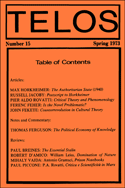 The relationship between phenomenology and critical theory is a complex one that deserves a great deal of attention. On the one hand, Marcuse, as a student of Heidegger, maintained a certain level of affiliation with his thought, while, on the other, Lukács and Adorno were critical of phenomenology, with Heidegger in particular coming under criticism. In “Critical Theory and Phenomenology,” Pier Aldo Rovatti attempts to show how these two modes of thought may have a meaningful encounter. The relationship between phenomenology and critical theory is a complex one that deserves a great deal of attention. On the one hand, Marcuse, as a student of Heidegger, maintained a certain level of affiliation with his thought, while, on the other, Lukács and Adorno were critical of phenomenology, with Heidegger in particular coming under criticism. In “Critical Theory and Phenomenology,” Pier Aldo Rovatti attempts to show how these two modes of thought may have a meaningful encounter.
Continue reading →
By Simon Glendinning · Monday, January 7, 2013 The following paper was presented at Telos in Europe: The L’Aquila Conference, held on September 7-9, 2012, in L’Aquila, Italy.
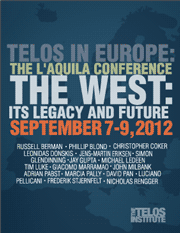 How should we conceive the distinctive character, the “particular rarity,” of the wearing and growing of the contemporary world? How should we come to terms with our time? What words can we find that are fitting for its specificity when so many of the words we have found fitting hitherto, especially promising words about the course of human history and its political hopes, its hopes in the political (modernity, Enlightenment, civilization, socialism, etc.) sound more and more like the road signs of another age? How should we conceive the distinctive character, the “particular rarity,” of the wearing and growing of the contemporary world? How should we come to terms with our time? What words can we find that are fitting for its specificity when so many of the words we have found fitting hitherto, especially promising words about the course of human history and its political hopes, its hopes in the political (modernity, Enlightenment, civilization, socialism, etc.) sound more and more like the road signs of another age?
Are we not floundering today? Isn’t this, at least in part, what we need to understand, to make intelligible? So we might look out for writings, wherever they come from, that speak to and speak from this world, a world which today, it seems, more than ever, “wears as it grows.”
Continue reading →
By Paul Rekret · Thursday, January 3, 2013 Paul Rekret’s “The Impasse of Post-Metaphysical Political Theory: On Derrida and Foucault ” appears in Telos 161 (Winter 2012). Read the full version online at the Telos Online website, or purchase a print copy of the issue in our store.
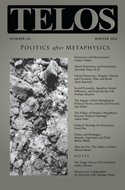 The debate between Jacques Derrida and Michel Foucault over the status of Descartes’ Meditations can be read to indicate some profound implications for the ways by which we conceive of a post-metaphysical political theory. This article documents the way in which the terms of the debate suggest that in conceiving politics after metaphysics in terms of competing accounts of the contingency of Being or, in Stephen White’s words, as weak ontologies, we are lead towards a profound paradox and impasse. To suggest that there is broad agreement in post-metaphysical political thought regarding the instability of ontology and the consequent theoretical task of questioning the grounds or foundations of particular political concepts or institutions is to overlook a fundamental paradox. What the debate between Derrida and Foucault in fact indicates is that these differing weak ontologies are in fact incommensurable with one another. The debate between Jacques Derrida and Michel Foucault over the status of Descartes’ Meditations can be read to indicate some profound implications for the ways by which we conceive of a post-metaphysical political theory. This article documents the way in which the terms of the debate suggest that in conceiving politics after metaphysics in terms of competing accounts of the contingency of Being or, in Stephen White’s words, as weak ontologies, we are lead towards a profound paradox and impasse. To suggest that there is broad agreement in post-metaphysical political thought regarding the instability of ontology and the consequent theoretical task of questioning the grounds or foundations of particular political concepts or institutions is to overlook a fundamental paradox. What the debate between Derrida and Foucault in fact indicates is that these differing weak ontologies are in fact incommensurable with one another.
Continue reading →
By David Pan · Wednesday, January 2, 2013 The following paper was presented at Telos in Europe: The L’Aquila Conference, held on September 7-9, 2012, in L’Aquila, Italy.
 Since the Treaty of Westphalia, sovereignty in the West has been imagined in terms of the nation-state and its ability to provide a universal basis for political relations both within state boundaries and in relations with other similarly organized entities. On the one hand, the nation-state originates as a means of overcoming the religious civil wars, and its establishment coincides with the attempt to relegate theological disputes to a private sphere that does not threaten the structure of the state. In this way, the state as opposed to the church becomes the primary form for defining the political. On the other hand, the development and stability of the nation-state system seems to have been inextricably linked to the dynamic of colonialism. As Carl Schmitt lays out in The Nomos of the Earth, the establishment of a jus publicum europaeum that created guidelines for limiting war between European states was accompanied and indeed predicated upon a complementary establishment of the amity lines that distinguished Europe from the rest of the world as the place of such limited war as against the “freedom” of the spaces beyond the line in which restrictions on warfare did not apply. For Schmitt, the relationship between these two dynamics, the coalescence of nation-state relations in Europe on the basis of a limitation of war and the establishment of unlimited war in those areas outside of Europe without nation-state structures, has not been coincidental but in fact constitutive for both the rise of the West and the structure of international relations in the modern world. Since the Treaty of Westphalia, sovereignty in the West has been imagined in terms of the nation-state and its ability to provide a universal basis for political relations both within state boundaries and in relations with other similarly organized entities. On the one hand, the nation-state originates as a means of overcoming the religious civil wars, and its establishment coincides with the attempt to relegate theological disputes to a private sphere that does not threaten the structure of the state. In this way, the state as opposed to the church becomes the primary form for defining the political. On the other hand, the development and stability of the nation-state system seems to have been inextricably linked to the dynamic of colonialism. As Carl Schmitt lays out in The Nomos of the Earth, the establishment of a jus publicum europaeum that created guidelines for limiting war between European states was accompanied and indeed predicated upon a complementary establishment of the amity lines that distinguished Europe from the rest of the world as the place of such limited war as against the “freedom” of the spaces beyond the line in which restrictions on warfare did not apply. For Schmitt, the relationship between these two dynamics, the coalescence of nation-state relations in Europe on the basis of a limitation of war and the establishment of unlimited war in those areas outside of Europe without nation-state structures, has not been coincidental but in fact constitutive for both the rise of the West and the structure of international relations in the modern world.
Continue reading →
By J. F. Dorahy · Monday, December 31, 2012 As an occasional feature on TELOSscope, we highlight a past Telos article whose critical insights continue to illuminate our thinking and challenge our assumptions. Today, J. F. Dorahy looks at Georg Lukács’s “The Dialectic of Labor: Beyond Causality and Teleology,” from Telos 6 (Fall 1970).
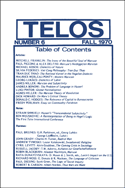 Georg Lukács’s essay “The Dialectic of Labor” belongs to the last period of his life and was composed in the context of the so-called “renaissance of Marxism”: a movement, beginning in the mid-1950s, within several of the Eastern Bloc nations—most notably Hungary, Poland, and the former Yugoslavia—that sought to re-energize the humanistic dimensions of Marxism suppressed by the enforcement of orthodoxy. Lukács’s substantive contribution to the “renaissance of Marxism” took the form of two enormous projects: a Marxist ontology (Zur Ontologie des gesellschaftichen Seins) and a systematic aesthetics (Die Eigenart des Ästhetischen). Although Lukács’s relationship to “dialectical and historical materialism” remains complex, “The Dialectic of Labor” stands as a reflection of this humanistic tendency inasmuch as it, by way of an ontological elucidation of the “philosophy of praxis,” emphasizes the functional role of subjectivity as a constitutive moment in the social-historical process. Georg Lukács’s essay “The Dialectic of Labor” belongs to the last period of his life and was composed in the context of the so-called “renaissance of Marxism”: a movement, beginning in the mid-1950s, within several of the Eastern Bloc nations—most notably Hungary, Poland, and the former Yugoslavia—that sought to re-energize the humanistic dimensions of Marxism suppressed by the enforcement of orthodoxy. Lukács’s substantive contribution to the “renaissance of Marxism” took the form of two enormous projects: a Marxist ontology (Zur Ontologie des gesellschaftichen Seins) and a systematic aesthetics (Die Eigenart des Ästhetischen). Although Lukács’s relationship to “dialectical and historical materialism” remains complex, “The Dialectic of Labor” stands as a reflection of this humanistic tendency inasmuch as it, by way of an ontological elucidation of the “philosophy of praxis,” emphasizes the functional role of subjectivity as a constitutive moment in the social-historical process.
Continue reading →
By Telos Press · Wednesday, December 19, 2012 Gary Lachman reviews Ernst Jünger’s The Adventurous Heart for Reality Sandwich:
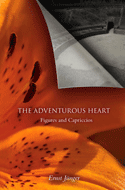 The Adventurous Heart is a collection of short essays, thoughts, stories, dreams, philosophical musings, and other unclassifiable writings on a number of experiences: nature, death, travel, sex, drugs, antique shops, museums, practically anything that caught Jünger’s ever inquisitive eye. It provides, as Jünger says, “small models of another way of seeing things.” This “other way” is what Jünger calls “stereoscopy,” the ability to see things in a dual aspect, perceiving their surface and depth simultaneously. . . . Jünger’s “stereoscopy” revealed to him the “secret correspondences existing between things,” and his reflections, written in an elegant, often lapidary style, trigger in the attentive reader a similar effect. The Adventurous Heart is a collection of short essays, thoughts, stories, dreams, philosophical musings, and other unclassifiable writings on a number of experiences: nature, death, travel, sex, drugs, antique shops, museums, practically anything that caught Jünger’s ever inquisitive eye. It provides, as Jünger says, “small models of another way of seeing things.” This “other way” is what Jünger calls “stereoscopy,” the ability to see things in a dual aspect, perceiving their surface and depth simultaneously. . . . Jünger’s “stereoscopy” revealed to him the “secret correspondences existing between things,” and his reflections, written in an elegant, often lapidary style, trigger in the attentive reader a similar effect.
Continue reading →
|
|
 The relationship between phenomenology and critical theory is a complex one that deserves a great deal of attention. On the one hand, Marcuse, as a student of Heidegger, maintained a certain level of affiliation with his thought, while, on the other, Lukács and Adorno were critical of phenomenology, with Heidegger in particular coming under criticism. In “Critical Theory and Phenomenology,” Pier Aldo Rovatti attempts to show how these two modes of thought may have a meaningful encounter.
The relationship between phenomenology and critical theory is a complex one that deserves a great deal of attention. On the one hand, Marcuse, as a student of Heidegger, maintained a certain level of affiliation with his thought, while, on the other, Lukács and Adorno were critical of phenomenology, with Heidegger in particular coming under criticism. In “Critical Theory and Phenomenology,” Pier Aldo Rovatti attempts to show how these two modes of thought may have a meaningful encounter.  How should we conceive the distinctive character, the “particular rarity,” of the wearing and growing of the contemporary world? How should we come to terms with our time? What words can we find that are fitting for its specificity when so many of the words we have found fitting hitherto, especially promising words about the course of human history and its political hopes, its hopes in the political (modernity, Enlightenment, civilization, socialism, etc.) sound more and more like the road signs of another age?
How should we conceive the distinctive character, the “particular rarity,” of the wearing and growing of the contemporary world? How should we come to terms with our time? What words can we find that are fitting for its specificity when so many of the words we have found fitting hitherto, especially promising words about the course of human history and its political hopes, its hopes in the political (modernity, Enlightenment, civilization, socialism, etc.) sound more and more like the road signs of another age?  The debate between Jacques Derrida and Michel Foucault over the status of Descartes’ Meditations can be read to indicate some profound implications for the ways by which we conceive of a post-metaphysical political theory. This article documents the way in which the terms of the debate suggest that in conceiving politics after metaphysics in terms of competing accounts of the contingency of Being or, in Stephen White’s words, as weak ontologies, we are lead towards a profound paradox and impasse. To suggest that there is broad agreement in post-metaphysical political thought regarding the instability of ontology and the consequent theoretical task of questioning the grounds or foundations of particular political concepts or institutions is to overlook a fundamental paradox. What the debate between Derrida and Foucault in fact indicates is that these differing weak ontologies are in fact incommensurable with one another.
The debate between Jacques Derrida and Michel Foucault over the status of Descartes’ Meditations can be read to indicate some profound implications for the ways by which we conceive of a post-metaphysical political theory. This article documents the way in which the terms of the debate suggest that in conceiving politics after metaphysics in terms of competing accounts of the contingency of Being or, in Stephen White’s words, as weak ontologies, we are lead towards a profound paradox and impasse. To suggest that there is broad agreement in post-metaphysical political thought regarding the instability of ontology and the consequent theoretical task of questioning the grounds or foundations of particular political concepts or institutions is to overlook a fundamental paradox. What the debate between Derrida and Foucault in fact indicates is that these differing weak ontologies are in fact incommensurable with one another. Georg Lukács’s essay “The Dialectic of Labor” belongs to the last period of his life and was composed in the context of the so-called “renaissance of Marxism”: a movement, beginning in the mid-1950s, within several of the Eastern Bloc nations—most notably Hungary, Poland, and the former Yugoslavia—that sought to re-energize the humanistic dimensions of Marxism suppressed by the enforcement of orthodoxy. Lukács’s substantive contribution to the “renaissance of Marxism” took the form of two enormous projects: a Marxist ontology (Zur Ontologie des gesellschaftichen Seins) and a systematic aesthetics (Die Eigenart des Ästhetischen). Although Lukács’s relationship to “dialectical and historical materialism” remains complex, “The Dialectic of Labor” stands as a reflection of this humanistic tendency inasmuch as it, by way of an ontological elucidation of the “philosophy of praxis,” emphasizes the functional role of subjectivity as a constitutive moment in the social-historical process.
Georg Lukács’s essay “The Dialectic of Labor” belongs to the last period of his life and was composed in the context of the so-called “renaissance of Marxism”: a movement, beginning in the mid-1950s, within several of the Eastern Bloc nations—most notably Hungary, Poland, and the former Yugoslavia—that sought to re-energize the humanistic dimensions of Marxism suppressed by the enforcement of orthodoxy. Lukács’s substantive contribution to the “renaissance of Marxism” took the form of two enormous projects: a Marxist ontology (Zur Ontologie des gesellschaftichen Seins) and a systematic aesthetics (Die Eigenart des Ästhetischen). Although Lukács’s relationship to “dialectical and historical materialism” remains complex, “The Dialectic of Labor” stands as a reflection of this humanistic tendency inasmuch as it, by way of an ontological elucidation of the “philosophy of praxis,” emphasizes the functional role of subjectivity as a constitutive moment in the social-historical process.  The Adventurous Heart is a collection of short essays, thoughts, stories, dreams, philosophical musings, and other unclassifiable writings on a number of experiences: nature, death, travel, sex, drugs, antique shops, museums, practically anything that caught Jünger’s ever inquisitive eye. It provides, as Jünger says, “small models of another way of seeing things.” This “other way” is what Jünger calls “stereoscopy,” the ability to see things in a dual aspect, perceiving their surface and depth simultaneously. . . . Jünger’s “stereoscopy” revealed to him the “secret correspondences existing between things,” and his reflections, written in an elegant, often lapidary style, trigger in the attentive reader a similar effect.
The Adventurous Heart is a collection of short essays, thoughts, stories, dreams, philosophical musings, and other unclassifiable writings on a number of experiences: nature, death, travel, sex, drugs, antique shops, museums, practically anything that caught Jünger’s ever inquisitive eye. It provides, as Jünger says, “small models of another way of seeing things.” This “other way” is what Jünger calls “stereoscopy,” the ability to see things in a dual aspect, perceiving their surface and depth simultaneously. . . . Jünger’s “stereoscopy” revealed to him the “secret correspondences existing between things,” and his reflections, written in an elegant, often lapidary style, trigger in the attentive reader a similar effect.

